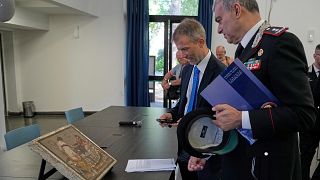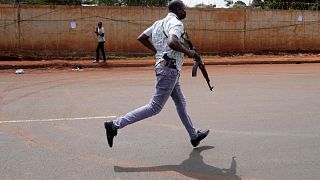Kenya
**Engineers Moses Kiuna and David Gathu are doing their usual round of dumpsites near Nairobi. They're after electronic waste, a valuable resource for building their gadgets.**They build numerous devices, but the one they're the proudest of is a robotic arm they say is controlled by brain sensors - mostly made from electronic waste, and assembled in their small workshop.
The two men, who earn their living as electricians, don't sell their inventions but showcase them in schools. Both of them dropped out of school, and they want to inspire students and encourage them to innovate just like them. They usually visit three schools per month.
At Thogoto Model primary school, they're setting up in the dining hall to demonstrate the gadgets. "Because of the lack of resources, we use the available materials," says Gathu. Kiuna explains how they work:
"The e-waste material that is being scattered around. The parts of electronics, we recycle them, we design prosthetic arms and other innovations. Now because it cannot be commercially viable, we have taken steps to go and help young kids. We teach young kids to become creative," he says. And their influence is already making a mark.
"Ever since these people came to our school, I have really been innovated (meant motivated) to become an innovator so that I can start up something and create something new," says Faith Wairimu, a pupil at Thogoto Model primary school.
"Our future lies here and just like there is a subject like mathematics, English, there should also be a subject like innovation so that it can teach us what to do in the future so that we can invent things that can help people."
The school's deputy principal, Peter Nyaga, is testing a muscle sensor, which can be used by amputees, to control the robotic arm. He says Kiuna and Gathu have had a positive impact on the students.
"Since the time this team started visiting the school, our learners have been motivated. Those who have not been doing well in other academic fields like mathematics and English, we have seen their interest going up. They are highly motivated, they want now to venture into those fields and even some of the things they are making can even help disabled people."
George Masila, senior corporate communications officer at the Kenya National Innovation Agency says the education the engineers are giving these young children is invaluable.
"We've seen the robotic arm (in the press), they are going to different schools across the country and kids can't wait to see them. So we think and we believe that innovation should be introduced in our schools at the earliest stage possible so we can promote creativity, we can promote innovation and we can promote students creating solutions for real societal problems."













01:01
Kenya: Visa-free travel now available for many African and Caribbean countries
00:22
Boniface Kariuki, a Kenyan mask vendor shot at close range laid to rest
11:17
Bridging the legal gap in Africa’s digital boom {Business Africa}
01:55
Burkina Faso's only eye doctor for children sees trauma of both play and conflict
Go to video
First Malaria treatment for babies approved
02:16
Kenya's William Ruto faces growing discontent over economy and police brutality